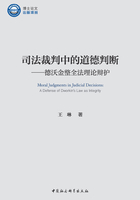
Abstract
Can judges make moral judgments in judicial process? Is it possible that adjudication involving such judgments could have the right answer in a certain sense? This is a very complex jurisprudential question. Dworkin offers an attractive but controversial answer:law as integrity theory. Law as integrity theory argues that:(1)the judges need to rely on moral judgments to identify what is law in specific cases;(2)adjudication involving moral judgments can have the right answer. Against both of Dworkin’s propositions,there are various criticisms,one of which explores the role of law based on the observation about the characteristics of communal moral life. Through analysis,we can see that all these criticisms can be answered by Dworkin’s own theoretical resource effectively.
Firstly,is the criticism based on the typical external skepticism against law as integrity tenable? Through questioning the distinction between first-order and second-order moral propositions,Dworkin excludes the relevance of metaphysical controversy in moral issues and then responds to the external skepticism effectively. In addition,through understanding“truth”as an interpretative concept,Dworkin introduces a truth conception suitable for moral domain:a value proposition is temporarily true if it can provide a better integral reflective equilibrium of the related value judgments.
Secondly,Posner’s criticism based on legal pragmatic position,as well as Sunstein’s criticism based on incompletely theorized agreements theory also failed,owing to their inability to distinguish their positions with Dworkin’s position validly. Although the legal reasoning that ordinary judges practice is in a different direction from the ideal judge “Hercules”,this does not mean that there are real differences between them,since they both pursue the legitimate legal authority through the pursuit of integral political ideal.
Thirdly,Shapiro’s criticism based on the planning theory of law,and Waldron’s criticism against law as integrity based on the analysis of the diversity of the legislature can also be rebutted by the internal logic of against law as integrity. There is an inherent conflict between seeking neutral concept analysis and effective guidance on legal practices these two objectives of the planning theory of law. To endow this theory with the practical significance Shapiro expects,it should be understood as a legal interpretation theory,just as law as integrity. By this standard,planning theory of law is flawed in its explanation of essential value of law. The drawbacks of Waldron’s arguments lie in his confusion between moral realism and moral objectivity two different issues. Dworkin’s proposition on moral objectivity does not depend on moral realism. Although moral realism is not related to whether the judge can make moral judgments,moral objectivity still matters for the legitimacy of the moral judgments of judges,which is not necessarily arbitrary. Additionally,Dworkin’s partnership democracy is superior to Waldron’s absolute majority democracy in explaining the legitimacy of political authority.
Finally,the Finnis’ critique on Dworkin’s right-answer-thesis based on the incommensurability of value also does not hold. We should distinguish the different implications of the incommensurability of value proposition between ethical and moral domains. On moral issues,there cannot be several different correct answers,since they cannot coexist logically. Besides,Finnis’ conception of justice is indeed a contractualism built upon mutual benefit,which fails to account for moral motives. Whereas,as a contractualism based on mutual respect,Ronald Dworkin’s conception of justice offers a more successful explanation of the legitimacy of political authority.
So far,to some degree we can conclude that these above examined current criticisms,which are based on philosophical reflections on human moral life,against Dworkin’s two propositions can be disproved with the help of Dworkin’s own theoretical resource. However,since Dworkin’s theory are fighting against the powerful legal positivism tradition,the final position on moral judgments in adjudication still cannot be determined based on my limited analysis in this thesis.
Dworkin’s law as integrity have important implications for legal research and legal practice. In the aspect of legal research,there are two main inspirations:firstly,the research of hard cases should change from causal analysis mode to reason analysis mode;secondly,the legal method should pursue the functional regression from“rationalization”to“justification”. In the aspect of legal practice,the enlightenment is to change our understanding of the nature of legal principles and to provide operational guidance for the application of legal principles.
Key words:law as integrity,Dworkin,moral judgment,the right-answer thesis.